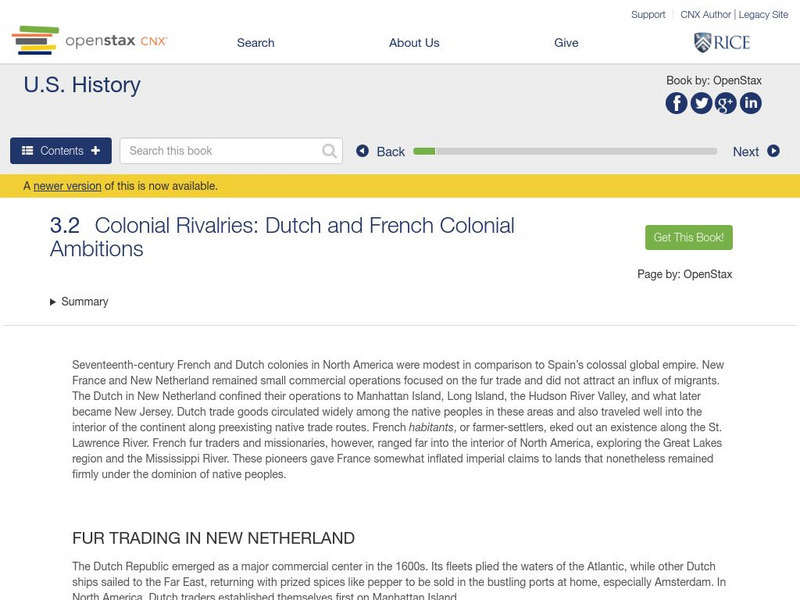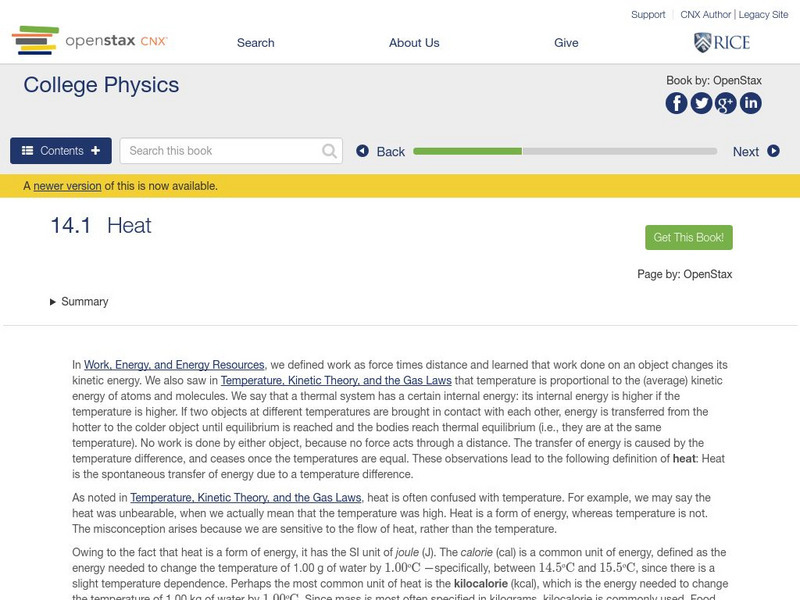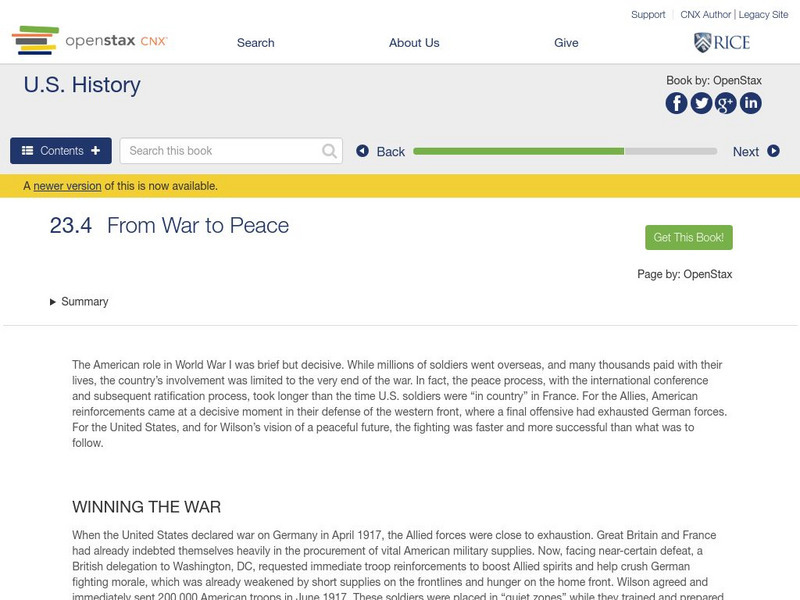Georgia State University
Georgia State University: Hyper Physics: Gravitational Potential Energy
This site defines and explains the concept of gravitational potential energy. Uses many equations and graphics to illustrate the idea. Provides an online computational practice set with immediate feedback.
Curated OER
National Park Service: Archaeology Program: The Earliest Americans Theme Study
This exhaustive study of Paleo-Indians examines many of the sites where evidence of their occupation is found across the North American continent. This National Park Service study looks at evidence in found in projectile points,...
The World Bank
World Bank Group: Income Inequality
This website examines the topic of income inequality and compares Brazil and Hungary. Lorenz Curves and Gini coefficients are used in this analysis. Includes a few discussion prompts.
University of Missouri
Exploring Constitutional Conflicts: The "Clear and Present Danger" Test
Modern first amendment law was formed by cases during the WWI era. Were dissent and subversive activity protected by freedom of speech? Examine five cases that answered this constitutional question. Included are the full opinions of the...
University of California
The History Project: The Antinomian Controversy
One of the most enduring myths in American history is the belief that the Puritans fled to America in search of religious liberty. Unfortunately, this belief is at best only a half-truth, The Puritans were strict religious people who...
University of North Carolina
Nc Civic Education Consortium: Joe Mc Carthy and the Red Scare
This very detailed lesson plan incorporates small group activities, whole group activities, projects, debate ideas, and primary sources all related to Joseph McCarthy. Extensive background material is provided along with a bibliography...
Mount Holyoke College
Mount Holyoke College: Early Cold War Era u.s. Foreign Policy
In his article entitled "Economic Interests, Party, and Ideology in Early Cold War Era U.S. Foreign Policy", Benjamin O. Fordham discusses the United States' foreign policy during the Cold War, focusing on the country's ideology, party...
OpenStax
Open Stax: Identity During the American Revolution
From a chapter on "America's War for Independence," this section of the chapter explains Loyalist and Patriot sentiments and identifies different groups that participated in the Revolutionary War.
OpenStax
Open Stax: Industrialization 1870 1900: A New American Consumer Culture
Learn about the development of the consumer mindset at the end of the 19th century.
OpenStax
Open Stax: Foreign Policy 1890 1914: Spanish American War and Overseas Empire
Looks at the development and evolution of the Spanish-American War, at Americans' views on imperialism at the end of this war, and at the relationship of this war with America's other international interests.
OpenStax
Open Stax: Jazz Age 1919 1929: Prosperity and Popular Entertainment
Examines the transformation of American culture and lifestyle through movies, sports and the automobile, particularly the Model T Ford.
OpenStax
Open Stax: Jazz Age: Redefining the Nation 1919 1929: Transformation and Backlash
Examines the role nativism played in 1920s America, the resurgence of the Ku Klux Klan, the disconnect between urban and rural lifestyles and values, and the fractious debate over evolution that was highlighted in the Scopes trial.
OpenStax
Open Stax: Fighting the Good Fight in Wwii 1941 1945: Victory in European Theater
Examines the diplomatic negotiations among the Big Three leaders - Roosevelt, Churchill and Stalin - during World War II. Discusses the invasion of North Africa, the invasion of Europe, the shock of seeing the impact of the Holocaust...
OpenStax
Open Stax: Linear Momentum and Force: Linear Momentum
From a chapter on Linear Momentum and Collisions in a Physics textbook. This section of the chapter covers linear momentum, how momentum and force are related, how momentum fits into Newton's second law of motion, and how to calculate...
OpenStax
Open Stax: Colonial Rivalries: Dutch and French Colonial Ambitions
After reading a section of a chapter on "Colonial Societies," students will be able to compare and contrast the development and character of the French and Dutch colonies in North America and discuss their economies.
OpenStax
Open Stax: Contesting Futures: America in 1960s: Lyndon Johnson and Great Society
Read about the reforms and legislation undertaken through Lyndon B. Johnson's concept of the Great Society. These included economic and educational reforms, consumer protection, changes to immigration laws, and the Voting Rights Act of...
OpenStax
Open Stax: College Physics: Heat
In this section of the textbook, find information about how heat and work transfer energy. Also understand how a heat transfer is related to temperature and what mechanical equivalent of heat relates to work and heat transfer. Book can...
OpenStax
Open Stax: College Physics: Viscosity and Laminar Flow: Poiseuille's Law
Understand the difference between laminar and turbulent flow and what fluid viscosity is by studying this section of a College Physics textbook. Section includes how to use Poiseuille's law to calculate fluid flow in a tube. Section also...
OpenStax
Open Stax: College Physics: Radiation
In this section of a college textbook, the topic of radiation is explored. Understand how the process of radiation transfers heat. Also learn how to calculate the rate of heat transfer by using the Stefan-Boltzmann law of radiation....
OpenStax
Open Stax: American Foreign Policy 1890 1914: Economic Imperialism in East Asia
As America's economic prowess grew, it was able to harness this power to expand its imperialistic arm into China. This mutually beneficial relationship lasted until after World War II when China became a communist country.
OpenStax
Open Stax: American Foreign Policy 1890 1914: Turner, Mahan, and Roots of Empire
Examines the development of American foreign policy in the latter part of the 1800s, and what Frederick Jackson Turner and Alfred Thayer Mahan did to further American imperialistic interests.
OpenStax
Open Stax: Americans and the Great War 1914 1919: From War to Peace
Examines how the United States contributed during the final stages of World War I, what Woodrow Wilson believed the world should look like after the war, and why the United States did not sign the Treaty of Versailles or join the League...
OpenStax
Open Stax: Wealth and Culture in the South
Read this section of a chapter on "The Antebellum South" to assess the distribution of wealth and learn about the southern culture of honor.
OpenStax
Open Stax: The Stamp Act and the Sons and Daughters of Liberty
From a chapter on "Imperial Reforms and Colonial Protests", this section explains the purpose of the 1765 Stamp Act and looks at the colonial responses to it.






















